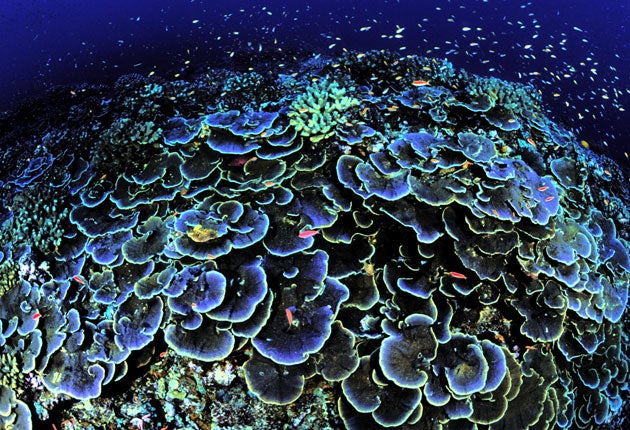Young coral 'threatened by noise pollution'

As if it's not bad enough for them with pollution, fishing by dynamiting, global warming and ocean acidification, the world's coral reefs face a new threat – from noise.
Scientists have discovered that baby corals, in their first days as free-swimming larvae in the ocean, find their way home by listening to the noise of animals on the reef, and actively swimming towards it.
But the findings raise new concerns for the future of coral reefs, as increasing human noise pollution in the world's oceans, from ships' engines to drilling to seismic exploration, is masking reef sounds.
Sometimes referred to as "the rainforests of the sea", coral reefs are among the world's richest ecosystems, holding a quarter of all marine species, from brilliantly coloured fish to sponges, although they occupy less than 1 per cent of the total ocean surface. Their economic value in terms of tourism, fishing and protection of shorelines has been estimated at greater than £20bn annually.
However, they are also among the most vulnerable, as they are extremely sensitive to seawater temperature, and global warming may destroy them – if present threats don't do that first. These include fishing using explosives and poisons such as cynanide, and industrial and agricultural pollution running off from the land. Another threat is the rising acidity of the oceans from the excess atmospheric carbon dioxide, which is itself causing temperatures to rise.
Some experts have suggested that coral reefs are now threatened with extinction, and point out that they can very much do without any more threats.
But there is a new one from noise pollution, as an international team of researchers working in the Caribbean has established, in discovering that coral larvae – which must quickly find a safe place to land and establish a colony or they will die – use sound as a cue to find coral reefs.(The reefs are massive colonies of the tiny living animals which secrete a hard exterior skeleton.)
A British member of the Dutch-led team that has been working in Curaçao in the Netherlands Antilles, Dr Steve Simpson of the University of Bristol, discovered several years ago that baby reef fish use sound as a cue to find coral reefs, but was amazed by the discovery that that applies to corals also.
The team designed a "choice chamber", a device that offers the small invertebrates two or more contrasting conditions, and allows them to move freely towards the one they prefer. They put coral larvae into it and played them recordings of a coral reef. The results clearly showed that the flea-sized larvae were strongly attracted to the noise as they sought a suitable habitat.
Coral larvae look like tiny eggs covered in hairs, and come from the same group of animals as sea anemones and jellyfish. How these simple creatures detect sound is unknown, but Dr Simpson said: "At close range, sound stirs up water molecules, and this could waggle tiny hair cells on the surface of the larvae."
Since corals, like fish, respond to reef sounds, then the masking effects of human noise pollution in coral environments is of extra concern, he said: "Anthropogenic noise has increased dramatically in recent years, with small boats, shipping, drilling, pile driving and seismic testing now sometimes drowning out the natural sounds of fish and snapping shrimps."
The researchers concluded that if, like settlement-stage reef fish and crustaceans, coral larvae use reef noise as a cue for orientation, the alleviation of noise pollution in the oceans may gain further urgency."
Join our commenting forum
Join thought-provoking conversations, follow other Independent readers and see their replies
Comments
Bookmark popover
Removed from bookmarks